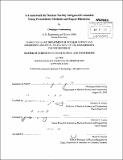A framework for nuclear facility safeguard evaluation using probabilistic methods and expert elicitation
Author(s)
Iamsumang, Chonlagarn
DownloadFull printable version (16.82Mb)
Other Contributors
Massachusetts Institute of Technology. Dept. of Nuclear Science and Engineering.
Advisor
Michael W. Golay.
Terms of use
Metadata
Show full item recordAbstract
With the advancement of the next generation of nuclear fuel cycle facilities, concerns of the effectiveness of nuclear facility safeguards have been increasing due to the inclusion of highly enriched material and reprocessing capability into fuel cycles. Therefore, an extensive and quantitative safeguard evaluation is required in order for the decision makers to have a consistent measure to verify safeguards level of protection, and to effectively improve the current safeguard scheme. The framework presented in this study provides a systematic method for safeguard evaluation of any nuclear facility. Using scenario analysis approach, a diversion scenario consists of target material, target location, diversion technique, set of tactics to help elude the safeguards, and the amount of material diverted per attempt. The success tree methodology and expert elicitation is used to construct logical models and obtain the probabilities of basic events. Then proliferator diversion success probabilities can be derived from the model for all possible scenarios in a given facility. Using Rokkasho reprocessing facility as an example, diversion pathways, uncertainty, sensitivity, and importance measure analyses are shown. Results from the analyses can be used by the safeguarder to gauge the level of protection provided by the current safeguard scheme, and to identify the weak points for improvements. The safeguarder is able to further analyze the effectiveness of the safeguard scheme for different facility designs, and the cost effectiveness analysis will help the safeguarder allocate limited resources for maximum possible protection against a material diversion.
Description
Thesis (S.M.)--Massachusetts Institute of Technology, Dept. of Nuclear Science and Engineering, 2010. Cataloged from PDF version of thesis. Includes bibliographical references (p. 99-100).
Date issued
2010Department
Massachusetts Institute of Technology. Department of Nuclear Science and EngineeringPublisher
Massachusetts Institute of Technology
Keywords
Nuclear Science and Engineering.